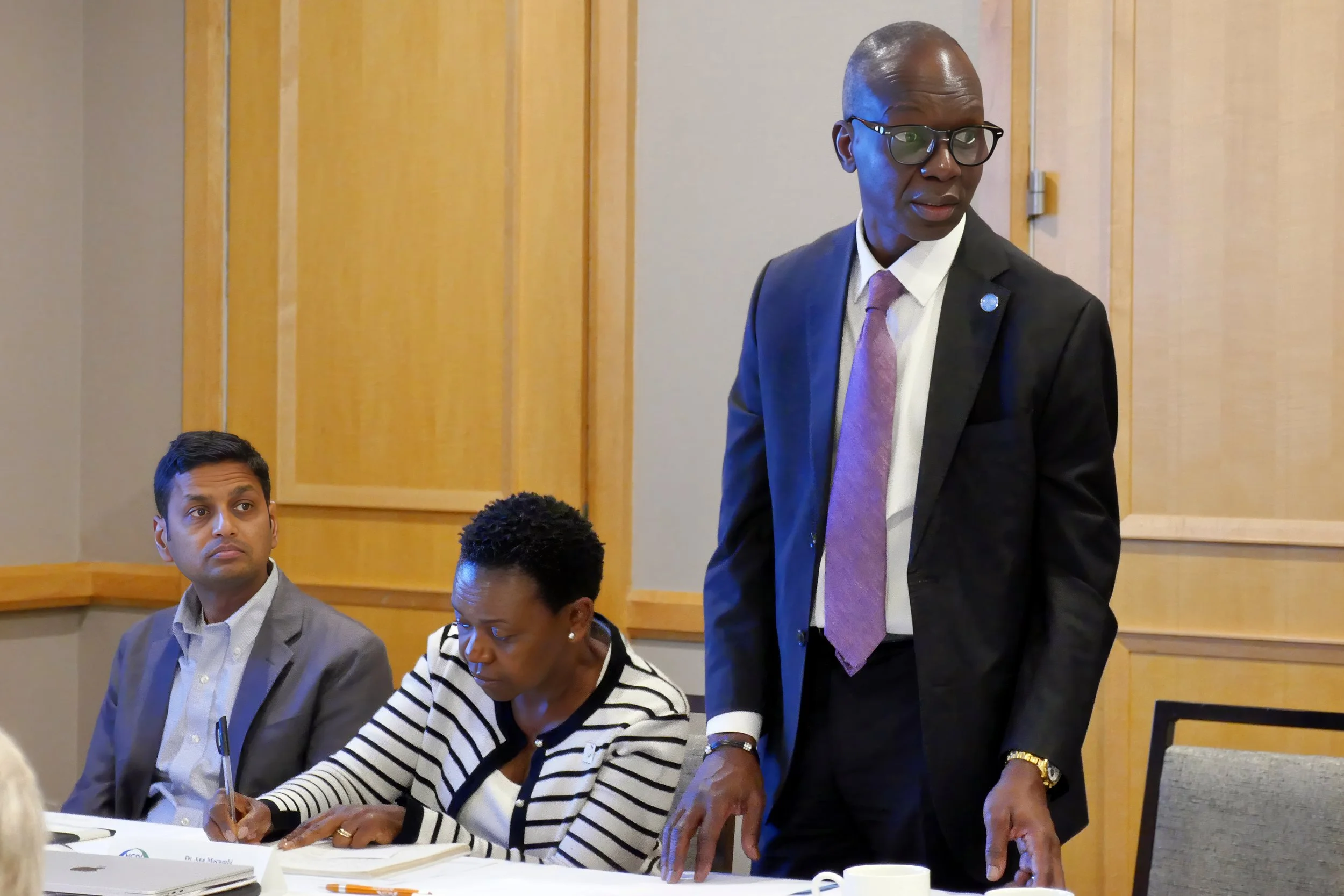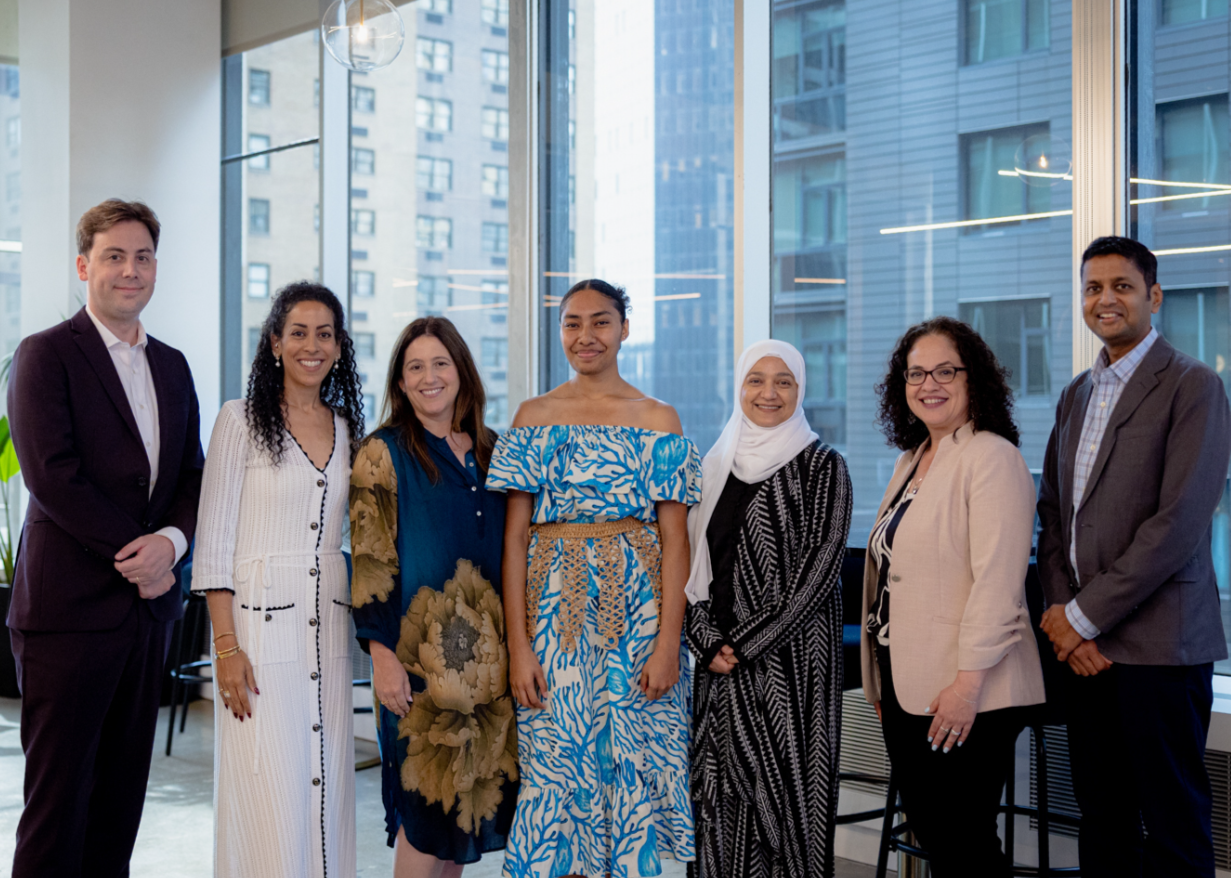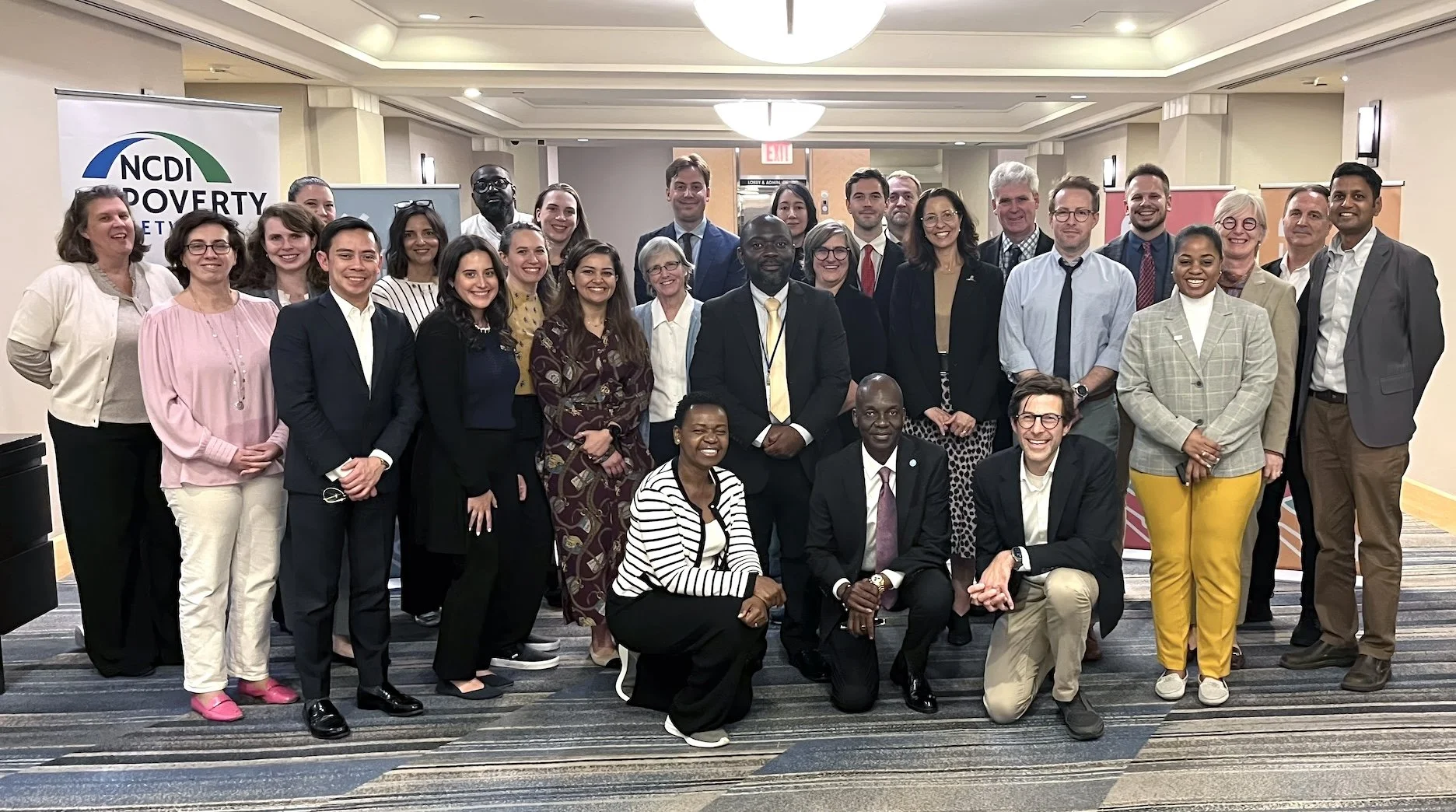PEN-Plus in the (Other) Spotlight During UNGA Week
Dr. Mohamed Janabi, director of the WHO African Region, joined the NCDI Poverty Network’s High-Level Advisory Group meeting on Sept. 23, on the sidelines of the UN General Assembly in New York City. There he voiced strong support for the PEN-Plus package of integrated clinical services for people living with severe noncommunicable diseases. Listening at far left is Dr. Neil Gupta, senior director of policy for the Network, while Dr. Ana Mocumbi, co-chair of the Network, takes notes. (Photo by Andrea Fleurant, NCDI Poverty Network)
As debate around the political declaration on noncommunicable diseases drew headlines and division at the United Nations General Assembly in late September, a growing success story quietly attracted its own spotlight.
Speaking on the UN floor in the opening plenary of the Sept. 25 High-Level Meeting on NCDs and Mental Health, eight African countries used valuable time from their allotted three minutes to highlight PEN-Plus, a package of integrated clinical services that is changing the game for children, adolescents, and young adults living with severe, chronic noncommunicable diseases (NCDs) in 29 countries across sub-Saharan Africa and southern Asia. The repeated mentions of PEN-Plus as a successful strategy for addressing NCDs formed a show of unity in a week often noted for dissension.
“You’ve likely heard the debate around the political declaration from the High-Level Meeting on NCDs and Mental Health, and how work toward consensus will need to continue in the coming weeks,” said Dr. Gene Bukhman, co-chair of the NCDI Poverty Network. “From our perspective, though, last week was an inflection point, evidence of the momentum of our shared movement to center the needs of people—particularly children and adolescents—living with severe, chronic diseases in low-income countries.”
The Hon. Kwabena Mintah Akandoh, Ghana’s minister of health, for example, declared that effective responses to NCDs will rely on integrating services within primary care, and that Ghana is using the PEN-Plus framework for that integration.
Akandoh also said Ghana is working to center the voices of people living with NCDs.
“We intentionally listen to people with lived experiences,” he said, “especially young people, because their voices influence better policies and foster greater trust.”
Roland Somda, minister of sports, youth, and employment for Burkina Faso, said his country is “addressing major noncommunicable diseases under the WHO PEN care delivery system, and starting the PEN-Plus system to fight type 1 diabetes, sickle cell anemia, and rheumatic [heart disease].”
Somda’s role in youth wellness is apt. Severe, chronic NCDs such as type 1 diabetes, sickle cell disease, and childhood-onset heart disease cause nearly 800,000 deaths a year among people younger than 40, and more than 60 percent of deaths, annually and globally, for youth aged 5 to 19.
Health ministers and representatives from Angola, the Democratic Republic of the Congo, Lesotho, Liberia, Malawi, and Mozambique also cited the importance of PEN-Plus in their plenary remarks.
“It is inspiring to see an opening for an expanded, more inclusive NCD agenda that acknowledges and addresses the intense impact of severe NCDs on families and communities also struggling with extreme poverty,” said Dr. Neil Gupta, the senior director of policy for the NCDI Poverty Network. “We hope to build on this momentum to fully embed new global targets and commitments to address this challenge.”
Dr. Neil Gupta (far right), senior director of policy for the NCDI Poverty Network, stands with fellow panelists at a Sept. 24 event on accelerating prevention and care for children and adolescents affected by NCDs. UNICEF USA hosted the event on the sidelines of the UN General Assembly in New York City. Also shown are James Reid (at left), type 1 diabetes program officer for The Leona M. and Harry B. Helmsley Charitable Trust, and Dr. Fouzia Shafique (third from right), associate director of health for UNICEF. (Photo courtesy of UNICEF USA)
The policy discussions and panel events during UNGA week in New York City coincided with significant progress on PEN-Plus initiation and programs globally. At a weeklong stakeholders’ meeting in late September in Abuja, Nigeria, participants inaugurated a steering committee and finalized an implementation plan and protocols for treatment of type 1 diabetes, sickle cell disease, and childhood-onset heart disease. Earlier in September, leaders from Angola, Eswatini, and Lesotho gathered for a study tour at a PEN-Plus clinic in Nhamatanda, Mozambique, to see PEN-Plus services firsthand. The study tour provided invaluable insight and guidance for the three visiting countries, which are progressing through early stages of PEN-Plus initiation.
Back in New York City, momentum for PEN-Plus was further reflected during UNGA week at events hosted by several global leaders in the NCD field, including the Global Health Council, St. Jude Children’s Research Hospital, and UNICEF.
The NCDI Poverty Network partners with those organizations and others around the world to support PEN-Plus programs in low- and lower-middle-income countries. All 47 member states of the World Health Organization’s Regional Office for Africa have adopted PEN-Plus as their principal strategy for advancing access to care for people living with severe, chronic NCDs. The WHO African Region has set the ambitious goal of having 70 percent of member states initiate PEN-Plus services by 2030.
NCDI Poverty Network advisory group members, staff, and partners pose together at the Network’s High-Level Advisory Group Meeting, held Sept. 23 in New York City. Kneeling in front, from left, are Network Co-Chair Dr. Ana Mocumbi; Dr. Mohamed Janabi, director of the WHO African Region; and Network Co-Chair Dr. Gene Bukhman.
Dr. Mohamed Janabi, director of the WHO African Region, pledged his continued support in a public statement he made after participating in a meeting of Network partners during UNGA week.
“At UNGA80, I joined the NCDI Poverty Network to celebrate five years of progress—proof that when leadership, resources, and partnerships align, transformation is possible,” Dr. Janabi stated. “The WHO African Region deeply values this partnership, which has been central to advancing the PEN-Plus vision across Africa. We reaffirm our commitment to scale up PEN-Plus so no family is left behind.”



